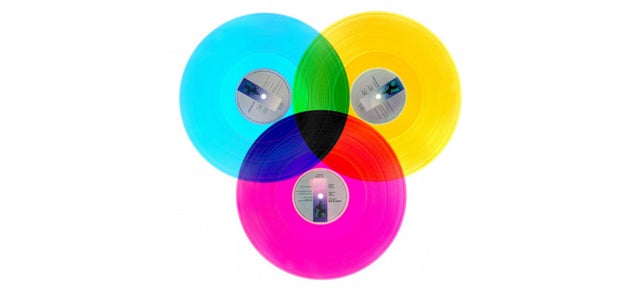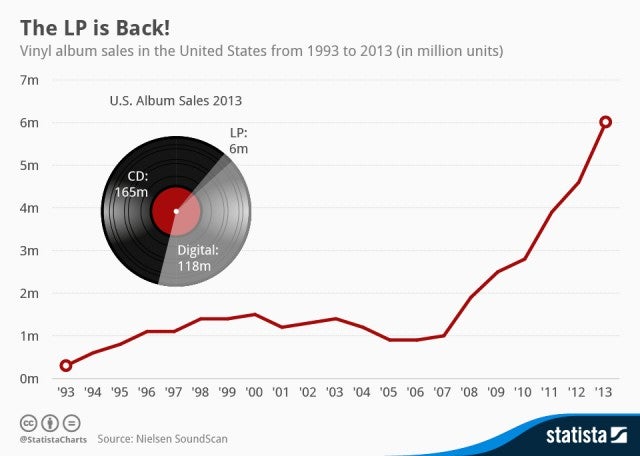
On any given Tuesday in the 90s, I would hustle to the record store after school to gawk at the new releases. Occasionally, I would take a CD home, greedily tear it open, pop it into my boombox, and listen while I pretended to do my homework. This wonderful experience has no value any more. It's obsolete.
That doesn't mean there's no worthwhile way to buy a real-world physical album. Even as the recording industry flails, vinyl is seeing a comeback. Maybe you've noticed this resurgence in the living rooms of pretentious friends who keep a crate full of ragged record jackets next to an old Technics turntable. At the very least, you've probably stumbled upon a small selection of shrink-wrapped records in trendy big city boutiques, and if not, maybe while Googling the meanings of Taylor Swift lyrics, you stumbled upon an Amazon listing for her latest record,Red, cut on 140 gram vinyl.
The renaissance of the long play record isn't just an anecdotal trend. Even as physical record sales decline, people are buying more vinyl than they have in decades. In 2013, sales increased 31-percent to about 6 million units year-over-year. It's not a single-year bump either, either. Sales have climbed to 6 million from after having been at about a million in 2007.

Why buy music at all?
In 2014, there is no good reason for most people to buy music. There's a moral argument about how we should support the artists, blah blah blah, they have families to feed, yadda, yadda, but the reality is that you're never going to force people to spend money if they don't have to. Today, there's just no practical way to force people to buy music—not unless you're Beyonce.
I'm not just talking about piracy. For a few years people were buying digital music because for some, the convenience of online stores like iTunes outweighed the inconvenience and legal risk of file sharing. But subscription music services like Spotify, Rdio, Beats Music, et al, are so easy and affordable to sign up for, that "owning music" is more complicated than just listening to whatever you want wherever you are on whatever device you happen to be using.
Yes, Spotify doesn't have everything, but it does have pretty damn close to everything, and for most people, it's a single, small, monthly expenditure that will satisfy the entirety of their music listening desires. And, of course, there are people out there who like buying things, especially from smaller artists. For them buying a CD means putting money in the artists' pocket. But even these magnanimous souls will admit that in the best-case scenario, the CD gets ripped to digital storage of some kind. Or worse, it's never played, and you just listen to the thing on Spotify anyway until it ends up in a landfill.
Convenience over audio quality
An overwhelming percentage of digital music files provide much worse sound quality than CDs, and people are choosing crappy digital anyway. It's possible to rip and uncompressed version of the music stored on a CD, but when most people rip their discs into iTunes, they choose to use one of many "lossy" compression formats because CD quality rips take up 7.5 times more spacethan a high-quality MP3. (Subscription music services offer roughly equivalent audio quality to a good MP3.) Most people don't care about the difference enough to trump the fact that scaling back audio quality lets you carry around 7.5 times more music and listen to it conveniently
For those people who do care about these things, online stores like HD tracks offer audiophile quality downloads. And yet, last year digital music sales took a dip for the first time since iTunes started selling tracks a decade ago. It shouldn't surprise you that in 2013 streaming music consumption increased by 32 percent, and now accounts for 16 percent of recording industry revenue. This would seem to confirm evidence that people who want to go digital really don't care about audio quality.RELATED
To turn to vinyl, then, I don't buy the argument that the format is seeing a resurgence because people think it sounds better. There's an ongoing debate amongst audiophiles and scientists regarding the audio quality of digital vs analog music playback. Audiophiles claim that analog playback sounds better, even though this is scientifically untrue. According to science, a CD and a vinyl record being pulled from the same original material are mathematically identical. Without going to far into it, suffice it to say that the 44.1 kHz/16-bit CD-quality spec isn't random—it's based on sampling theory, which proves that given that the highest frequency you can here is 20,000 Hz, using a higher sampling rate or resolution is mathematically inconsequential.
Some people choose to dispute science and instead trust their easily deluded senses, or maybe they just like the sound of a record scratching on the surface of a record. These fans only help prove my point: People are turning to vinyl because they enjoy it more.
The case for vinyl
The people who actually care about the experience of ownership are increasingly turning back to vinyl because it gives you a physical experience that's more fulfilling than a simple CD purchase. There are a few reasons this might be the case, but it all boils down to experience: a warm and fuzzy happy feeling you get from buying and playing LPs that you just can't get from any other source.
Vinyl has always offered a more intimate experience. The large format feels more substantial and turns the design of the cover and the inserts into satisfying artworks in their own right in a way that a CD never could. There's something wonderfully interactive about putting on a record, listening to a side, and then flipping it over to hear the other side. It makes the listening experience something in which you are constantly physically and emotionally involved. It's social, and fun, a far cry from the passive aural experience of CDs or digital.
As for the sound of vinyl, let's return to the sound of the scratching record. I remember my father, a lifelong music collector, was puzzled when I first got into vinyl in high school. He'd been an early adopter of CDs because they did away with the interference of scratch. But scratch isn't a negative; it adds texture and warmth. Some musicians go so far as to add it to digital recordings to give them "character."
Vinyl can be fragile, yes, among other imperfections. But those end up being part of its charm. Older records warp, needles wobble on their surface and skip over scratches. This is also turns records into nostalgia factories. I love the hand-me-down first pressing of Sticky Fingers my godfather gave me. What am I gonna give my kids? A flash drive? The password to my Dropbox?
Vinyl's fatal flaw, and the reason that the format lost to cassettes and later CDs, is that you can't take it with you. It's impractical.
But today, you don't have to have it just one way. Vinyl record purchases come with codes which allow you to download digital versions of the music on-board. I've bought about a dozen new release vinyls in the last two years, and every single one came with a free download. A survey of a few different record labels confirm that vinyls all seem to come with a free digital version. What's more, thanks to Amazon's Autorip service, you'll get an MP3 with your vinyl through that store as well. You really can take it with you.
The future of music is selling an experience
Music executives hate digital. Once upon a time, they could sell you a piece of plastic at an exorbitant markup, and people paid. Of course they did! People can't live without music. People fall in love with songs and want to listen to them over and over again, and the most convenient way to do that for a long time was to buy the music. Sure, you could copy tapes, and later CDs, but nothing ever really cut into music sales until the MP3 and broadband internet connections made it so that people didn't have to.
Now that buying music is a choice, the people in every part of the music industry need to pay attention to the people who are choosing to buy, even when they don't have to. How can they create a product that people want to spend money on? It's not enough to say that the musicians "deserve" to make money. You have to make a compelling argument. Vinyl does this to a certain extent, but even if vinyl sales keep growing they're never going to be enough.
I'm not claiming to have the answer, but it seems clear that if the business of recording and selling music is going to survive it's going to have to figure out how to encourage people to pay because they love it and it makes them happy—which is why people care about music in the first place.
Vinyl isn't just music. It's an experience. And one that's worth paying for.
Follow GistaNaija on Twitter @GistaNaija and Facebook GistaNigeria
Weird Stories | Weight Loss & Fitness Tips |Small Business Guide | Infotech Arena Tech News
No comments:
Post a Comment
Add A Comment